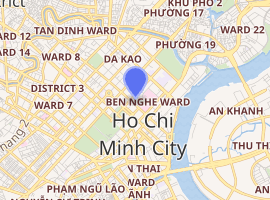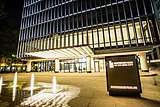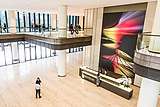Deutsches Haus Ho Chi Minh City
The Deutsches Haus Ho Chi Minh City (English translation German House Ho Chi Minh City) is a building complex in Ho Chi Minh City, Vietnam, which was opened 2017. The 25-story building complex was initiated under a bilateral government agreement between Germany and Vietnam, with the purpose of setting standards for energy efficiency “made in Germany.” It is the location of the German Consulate General and other institutions and businesses, as well as a cultural and economic hub for German representation in Vietnam.[1][2]
| Deutsches Haus Ho Chi Minh City | |
|---|---|
 Exterior view, December 2017 | |

| |
| General information | |
| Status | Soft Opening |
| Type | Office, Consulate-general, Convention center, Restaurant, Cafes, Gym |
| Location | 33 Le Duan Blvd., District 1, Ho Chi Minh City, Vietnam |
| Coordinates | 10.7816°N 106.7004°E |
| Construction started | 2014 |
| Completed | 2017 |
| Cost | US$100 Million |
| Height | |
| Roof | 107 metres (351 ft) |
| Technical details | |
| Material | Reinforced concrete, Steel, Glass, Double-skin facade, LED facade |
| Floor count | 25 (+4 below ground floors) |
| Floor area | 40,000 m² |
| Design and construction | |
| Architect | Gerkan, Marg and Partners (gmp), Germany |
| Website | |
| www | |
History
After the Deutsches Haus received its first political mention by the German Federal Foreign Minister Frank-Walter Steinmeier in 2008, the construction project was approved in 2013. Chancellor Angela Merkel regarded the building permit as an “important symbol” of further rapprochement between Germany and Vietnam. According to her statement, German institutions and interested German companies will have their common seat at the Deutsches Haus in Ho Chi Minh City.[3][4]
In October 2015 was the official groundbreaking ceremony in the presence of international guests from the political, societal, and economic fields.
Also in 2015, the project was also distinguished as the Best Office Development and Best Green Development by the Vietnam Property Awards.[5]
In 2016, the Deutsche Haus received the award for Best Green Building Development at the South East Asia Property Awards 2016.[6]
In November 2016, the topping-out ceremony took place. The distinguished guests included Federal Foreign Minister Steinmeier.[7]
In September 2017, the building was completed and opened as part of a soft opening.[8] The Vietnamese Party secretary for Ho-Chi-Minh City, Nguyễn Thiện Nhân, and others attended the ceremony.[9]
The German-born CEO of the owner company, Horst Geicke, sees the Deutsches Haus as the main address for German, Central European and global companies and investors in Vietnam and ASEAN.[10][11]
Since September 2018, there are three Buddy Bears in the lobby of the Deutsches Haus, symbolizing the bond between Germany and Vietnam, whose motifs show different aspects of the German-Vietnamese relationship.[12]
 Topping out event with investors and politicians
Topping out event with investors and politicians Topping out
Topping out Symbolic key handover to the Consul General
Symbolic key handover to the Consul General Buddy Bears
Buddy Bears
Design and Ecology

The architectural concept expresses Germany’s leading role as an industrial and technological nation through transparency and structured nature, economic construction, and energy efficiency. According to the Federal Ministry of Economics, the building will set new standards for energy efficiency and environmental building standards in Vietnam by the use of ecological building materials in combination with the latest technology from Germany.
A double facade is adapted to the climatic conditions of the country and will contribute significantly to energy savings.[13]
A glass facade signals openness to the urban environment. The two buildings which are different in height are interconnected by “glass joints.” An arcade will open the high-rise buildings on the ground floor area to both street fronts and connect the entries with the different lobbies and areas.[14]
Gallery
 Deutsches Haus by night
Deutsches Haus by night Main entrance
Main entrance Main entrance
Main entrance Lobby
Lobby Lobby
Lobby Conference room
Conference room View of an office
View of an office View of a lounge
View of a lounge Fitness room
Fitness room.jpg) Inauguration of Deutsches Haus Ho Chi Minh City
Inauguration of Deutsches Haus Ho Chi Minh City
Further

The building complex is also called Deutsches Haus HCMC or Deutsches Haus in Vietnam.
The owner is Deutsches Haus Vietnam Invest Ltd., a consortium of investors.
The British, French and US consulates-general are located next to Deutsches Haus.
The Federal Republic of Germany originally bought the property in 1960. After a dispossession in 1975, Germany regained the usage right to the property in 2011.[15]
External links
References
- "Deutsches Haus - A lighthouse for German-Vietnamese partnership", Vietnam Investment Review
- "Deutsches Haus breaks ground in HCM City", The Voice of Vietnam
- "Bringing the partnership to life", Federal Government of Germany
- "Germany builds a home in Ho Chi Minh City, eyes investment opportunities", thanhniennews.com
- "Vietnam Property Awards 2016: the complete winners list", asiapropertyawards.com, date
- Vietnam, Delegate of German Industry and Commerce in. "Deutsches Haus Ho Chi Minh City has been awarded the "South East Asia Property Awards 2016" for the "Best Green Building Development" in South East Asia". www.vietnam.ahk.de (in Vietnamese). Retrieved 2017-11-05.
- "State-of-the-art Deutsches Haus topped out". Vietnam Investment Review. 2016-11-02. Retrieved 2017-03-03.
- Vietnam, Delegate of German Industry and Commerce in. "Countdown for the opening of Deutsches Haus Ho Chi Minh City". www.vietnam.ahk.de (in German). Retrieved 2017-10-16.
- ""German House" to tighten relationship between Vietnam and European businesses - Tuoi Tre News". Tuoi Tre News (in Vietnamese). Retrieved 2017-11-23.
- "Deutsches Haus - A lighthouse for German-Vietnamese partnership", Vietnam Investment Review
- "Aiming High in Ho Chi Minh City", Handelsblatt
- "Buddybärenfamilie zieht ins Deutsche Haus!". vietnam.diplo.de (in German). Retrieved 2019-11-25.
- "Immobilien in Ho-Chi-Minh-Stadt: Deutscher Investor baut auf Saigon" (in German). 2017-04-21. Retrieved 2017-11-23.
- "Architectural Concept", deutscheshausvietnam.com
- "FAZ - Wie ein Deutscher Milliarden in Asien investiert" (in German). 2014-12-12. Retrieved 2017-11-23.